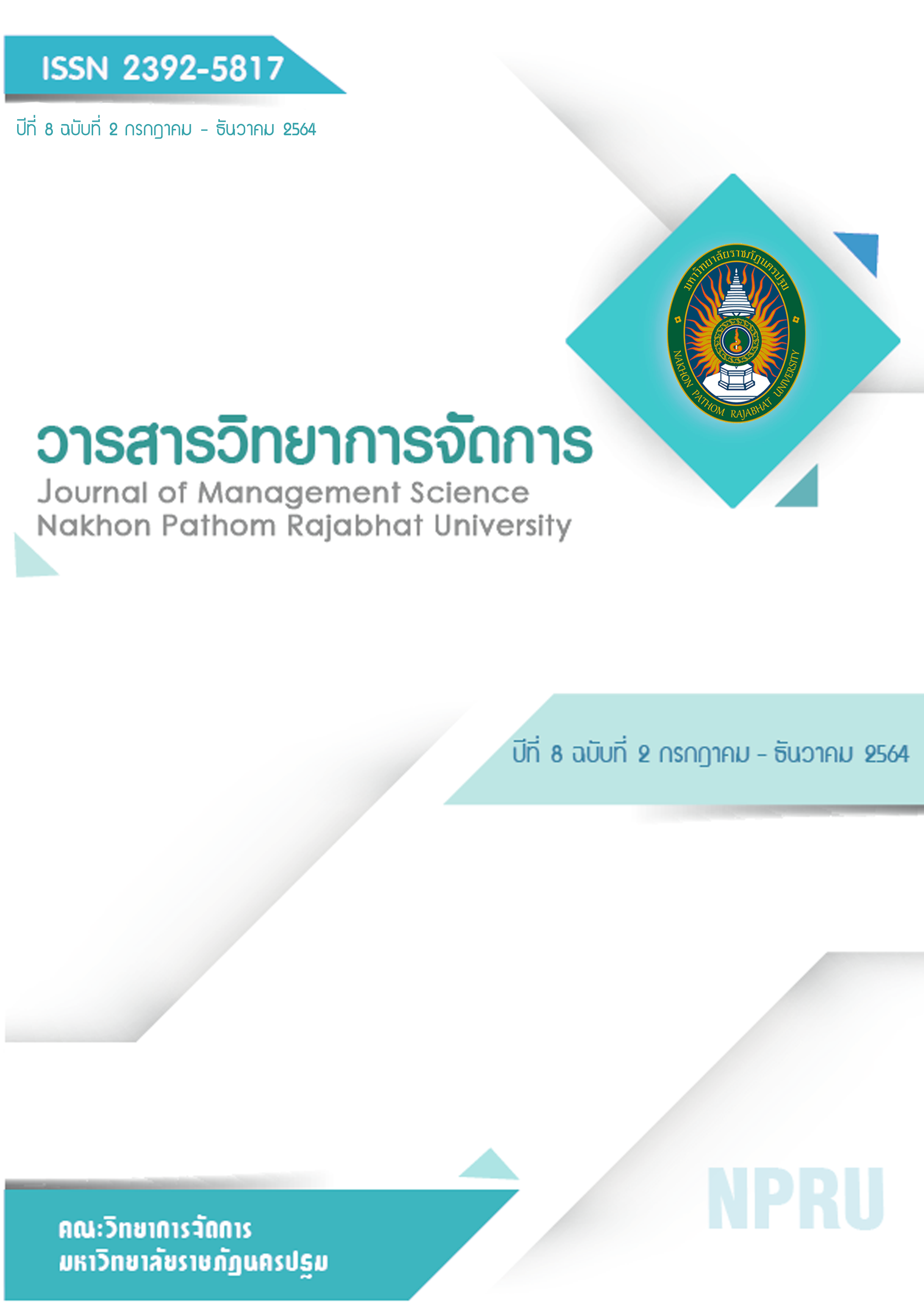ประสิทธิผลการบริหารจัดการองค์การบริหารส่วนตำบลในจังหวัดนนทบุรี
Main Article Content
บทคัดย่อ
บทความวิจัยฉบับนี้ มีวัตถุประสงค์เพื่อ 1) ศึกษาสภาพปัจจุบันในการบริหารจัดการองค์การบริหารส่วนตำบลในจังหวัดนนทบุรี 2) ศึกษาปัญหาและอุปสรรคที่มีต่อประสิทธิผลการบริหารจัดการองค์การบริหารส่วนตำบลในจังหวัดนนทบุรี และ3)เพื่อเสนอแนะแนวทางการบริหารจัดการองค์การบริหารส่วนตำบลในจังหวัดนนทบุรี ใช้วิธีการวิจัยเชิงคุณภาพด้วยวิธีการสัมภาษณ์เชิงลึกจากกลุ่มผู้ให้ข้อมูลสำคัญ ประกอบด้วย นายกองค์การบริหารส่วนตำบล ประธานสภาองค์การบริหารส่วนตำบล เลขานุการสภาองค์การบริหารส่วนตำบล ปลัดองค์การบริหารส่วนตำบล เจ้าหน้าที่ปฏิบัติงาน ผู้นำชุมชนและประชาชน รวมทั้งสิ้น 36 คน แล้วพรรณนาหาข้อสรุปอย่างเป็นระบบมีเหตุผลอ้างอิงทฤษฎีดำเนินการจัดระเบียบข้อมูล
ผลการวิจัยพบว่า
1) สภาพปัจจุบันในการบริหารจัดการองค์การบริหารส่วนตำบล มีผลมาจากสภาพทางสังคม เศรษฐกิจกิจ การเมือง และเทคโนโลยี เป็นบทสะท้อนประสิทธิผลการบริหารจัดการองค์การบริหารส่วนตำบลในจังหวัดนนทบุรี
2) ปัญหาและอุปสรรคในเรื่องกฎระเบียบ ข้อบังคับ กลุ่มผลประโยชน์ สภาพแวดล้อมทางการเมืองในระดับท้องถิ่น และการมีส่วนร่วมของประชาชนเป็นปัญหาที่คงอยู่ในระดับท้องถิ่นที่ส่งผลต่อประสิทธิผลการบริหารจัดการองค์การบริหารส่วนตำบลในจังหวัดนนทบุรี
3) แนวทางการบริหารจัดการองค์การบริหารส่วนตำบลในจังหวัดนนทบุรี โดยอิงสิ่งที่ค้นพบจากการวิจัยดังต่อไปนี้ 3.1) การกำหนดขนาดที่เหมาะสมกับสภาพพื้นที่ 3.2) การจัดสรรงบประมาณให้เหมาะสมกับขนาดและภารกิจ 3.3) การส่งเสริมให้ประชาชนเข้ามามีส่วนร่วมที่เหมาะสมกับการบริหารงานขององค์การบริหารส่วนตำบล และ 3.4) การกำหนดแนวทางการติดตาม ตรวจสอบ และประเมินผลการดำเนินงานอย่างมีผลสัมฤทธิ์เชิงประจักษ์ภายใต้แนวนโยบายและแผนยุทธศาสตร์ที่ได้วางไว้อย่างชัดเจนตามแนวทางหลักการบริหารกิจการบ้านเมืองที่ดี
* อาจารย์ประจำหลักสูตรรัฐประศาสนศาสตรมหาบัณฑิต บัณฑิตวิทยาลัย มหาวิทยาลัยเวสเทิร์น 12150
Corresponding author: pa.phatsorn@hotmail.com
Article Details
ทัศนะและข้อคิดเห็นของบทความที่ปรากฏในวารสารฉบับนี้เป็นของผู้เขียนแต่ละท่าน ไม่ถือว่าเป็นทัศนะและความรับผิดชอบของกองบรรณาธิการ
เอกสารอ้างอิง
ดวงฤทธิ์ เบ็ญจาธิกุลชัยรุ่งเรือง. (2564). การมีส่วนร่วมของประชาชนในการพัฒนาท้องถิ่นอย่างยั่งยืนของกรุงเทพมหานคร. วารสารสังคมศาสตร์และมานุษยวิทยาเชิงพุทธ, 6(3), 76-91.
ติน ปรัชญพฤทธิ์. (2535). ศัพท์รัฐประศาสนศาสตร์ (พิมพ์ครั้งที่ 2). กรุงเทพฯ: สำนักพิมพ์จุฬาลงกรณ์มหาวิทยาลัย.
นฤมล เพ็ญสิริวรรณ. (2562). ปัจจัยที่ส่งผลต่อภาวะผู้นำของผู้บริหารเทศบาลตำบลในจังหวัดนนทบุรี. วารสารมหาจุฬานาครทรรศน์, 6(10), 2641-5658.
นันธิดา จันทร์ศิริ. (2558). ธรรมาภิบาลระดับท้องถิ่น: มุมมองด้านการมีส่วนร่วมของประชาชนในการบริหารจัดการท้องถิ่น. วารสารมนุษยศาสตร์และสังคมศาสตร์มหาวิทยาลัยราชภัฏสุราษฎร์ธานี, 7(2), 95-117.
บูฆอรี ยีหมะ. (2552). ความรู้เบื้องต้นทางรัฐศาสตร์ (พิมพ์ครั้งที่ 2). สงขลา: สาขาวิชารัฐประศาสนศาสตร์ คณะมนุษยศาสตร์และสังคมศาสตร์ มหาวิทยาลัยราชภัฏสงขลา.
บุษกร เชี่ยวจินดากานต์. (2561). เทคนิคการวิจัยเชิงคุณภาพแบบกรณีศึกษา. วารสารศิลปศาสตร์ปริทัศน์ คณะศิลปะศาสตร์ มหาวิทยาลัยหัวเฉียวเฉลิมพระเกียรติ. 13(25), 103-118.
ประโยชน์ ส่งกลิ่น. (2556). การบริหารรัฐกิจยุคหลังสมัยใหม่: แนวคิด ทฤษฎีและการน้าไปปฏิบัติ. มหาสารคาม: อภิชาติการพิมพ์.
ปัณณธร เธียรชัยพฤกษ์. (2561). ทิศทางองค์กรปกครองส่วนท้องถิ่นไทยในอนาคต. วารสาร มจร พุทธปัญญาปริทรรศน์, 3(2), 183-196.
ธนิศร ยืนยง. (2561). การมีส่วนร่วมของประชาชนที่ส่งผลต่อการพัฒนาท้องถิ่นในจังหวัดนครนายก. วารสารมหาจุฬานาครทรรศน์, 5(2), 119 - 135.
พีระพงษ์ วรภัทร์ถิระกุล. (2564). ภาวะผู้นำ และวัฒนธรรมองค์การที่มีผลต่อคุณภาพชีวิตในการทำงานของบุคลากรสำนักงานคณะกรรมการกิจการกระจายเสียง กิจการโทรทัศน์ และกิจการโทรคมนาคมแห่งชาติ (กสทช.). วารสารวิจัยมหาวิทยาลัยเวสเทิร์น มนุษยศาสตร์และสังคมศาสตร์. 7(2), 60-71.
พีรพงศ์ กนกเลิศวงศ์ และธนสุวิทย์ ทับหิรัญรักษ์. (2563). ปัจจัยที่มีผลต่อการบริหารการปกครองส่วนท้องถิ่นในจังหวัดนนทบุรี. วารสารวิชาการ มจร บุรีรัมย์, 5(1), 109-121.
รัชยา ภักดีจิตต์. (2557). ธรรมาภิบาลเพื่อการบริหารภาครัฐและภาคเอกชน (พิมพ์ครั้งที่ 2). กรุงเทพฯ: สำนักพิมพ์แห่งจุฬาลงกรณ์มหาวิทยาลัย.
วุฒิสาร ตันไชย. (2557). การกระจายอ้านาจและประชาธิปไตยในประเทศไทย. กรุงเทพฯ: สถาบัน พระปกเกล้า.
วิศาล ศรีมหาวโร. (2556). สังคมวิทยาการเมืองการปกครอง (พิมพ์ครั้งที่ 2). กรุงเทพฯ: โอเดียนสโตร์.
ของวลินเนศวร์ ธีรการุณวงค์. (2562). การบริหารตามหลักธรรมาภิบาลที่ส่งผลต่อประสิทธิผลของเทศบาลตำบลในจังหวัดนนทบุรี. รัฐประศาสนศาสตรดุษฎีบัณฑิต, มหาวิทยาลัยปทุมธานี.
ศุภวัฒนากร วงศ์ธนวสุ, ดิเรก ปัทมสิริวัฒน์, พีรสิทธิ์ คำนวณศิลป์, ลิลี่ โกศัยยานนท์, หควณ ชูเพ็ญ, และธัชเฉลิม สุทธิพงษ์ประชา. (2557). การปฏิรูปการปกครองท้องถิ่นตาม กระบวนทัศน์แห่งการบริหารกิจการสาธารณะแนวใหม่. ขอนแก่น: วิทยาลัยการปกครองท้องถิ่น มหาวิทยาลัยขอนแก่น.
อภิษฎาข์ ศรีเครือดง นภัทร์ แก้วนาค ธนู ทดแทนคุณ และลัดดา แพรภัทรพิศุทธ. (2563). รูปแบบการเสริมสร้างการมีส่วนร่วมในการส่งเสริมความโปร่งใส ขององค์กรปกครองส่วนท้องถิ่นไทยในทศวรรษหน้า. วารสารศิลปะศาสตร์ราชมงคลสุวรรณภูมิ, 2(1),341-356.
Cramer, W., & Persaud, P. (2004). Decentralization and local government in the Caribbean. n.p.: National Democratic Institute for International Affairs (NDI).
Powell, Jr., G. B., & Powell, E. N. (2005). Democratization briefing paper. n.p.: College Board.
SNV East and Southern Africa. SNV Netherlands development organization. (2004). Strengthening local governance: Finding quality advisory approaches. Nairobi, Kenya: Organization.
Samarasinghe, S. W. R. de A. (1994). Democracy and democratization in developing countries. Boston, Massachusetts: Department of Population and International Health, Harvard School of Public Health.
Schneider, A. (2003). Decentralization: Conceptualization and measurement. Studies in Comparative International Development, 38(3), 32-56
White, S. (2011). Government decentralization in the 21st century: A literature review.
Washington, D. C.: Center for Strategic and international Studies (CSIS).

